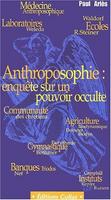Movement

photo credits: Wikimedia Commons
Anthroposophy is a spiritual movement which was founded in the early 20th century by the esotericist Rudolf Steiner that postulates the existence of an objective, intellectually comprehensible spiritual world, accessible to human experience. Followers of anthroposophy aim to engage in spiritual discovery through a mode of thought independent of sensory experience.: 3–11, 392–5 While much of anthroposophy is pseudoscientific, proponents claim to present their ideas in a manner that is verifiable by rational discourse and say that they seek precision and clarity comparable to that obtained by scientists investigating the physical world. Anthroposophy has its roots in German idealism, mystical philosophies, and pseudoscience including racist pseudoscience. Critics and proponents alike acknowledge his many anti-racist statements, often far ahead of his contemporaries and predecessors still commonly cited today. Steiner chose the term anthroposophy (from Greek ἄνθρωπος anthropos-, 'human', and σοφία sophia, 'wisdom') to emphasize his philosophy's humanistic orientation. He defined it as "a scientific exploration of the spiritual world", Others have variously called it a "philosophy and cultural movement", a "spiritual movement", a "spiritual science", "a system of thought", or a new religious movement. Anthroposophical ideas have been employed in alternative movements and studied empirically in a range of fields including education (both in Waldorf schools and in the Camphill movement), environmental conservation and banking; with additional applications in agriculture, organizational development, the arts, and more. The main organization for advocacy of Steiner's ideas, the Anthroposophical Society, is headquartered at the Goetheanum in Dornach, Switzerland. Anthroposophy's supporters include writers Saul Bellow, and Selma Lagerlöf, painters Piet Mondrian, Wassily Kandinsky and Hilma af Klint, filmmaker Andrei Tarkovsky, child psychiatrist Eva Frommer, music therapist Maria Schüppel, Romuva religious founder Vydūnas, and former president of Georgia Zviad Gamsakhurdia. Though several prominent members of the Nazi Party were supporters of anthroposophy and its movements, including Erhard Bartsch (an agriculturalist), SS colonel Hermann Schneider, and Gestapo chief Heinrich Müller, anti-Nazis such as Traute Lafrenz, a member of the White Rose resistance movement, were also followers. Rudolf Hess, the adjunct Führer, was a patron of Waldorf schools and a staunch defender of biodynamic agriculture.The historian of religion Olav Hammer has termed anthroposophy "the most important esoteric society in European history". Many scientists, physicians, and philosophers, including Michael Shermer, Michael Ruse, Edzard Ernst, David Gorski, and Simon Singh have criticized anthroposophy's application in the areas of medicine, biology, agriculture, and education to be dangerous and pseudoscientific. Ideas of Steiner's that are unsupported or disproven by modern science include: racial evolution, clairvoyance (Steiner claimed he was clairvoyant), and the Atlantis myth. Source: Wikipedia (en)
associated_with_this_movement 2
Movement - wd:Q184719





